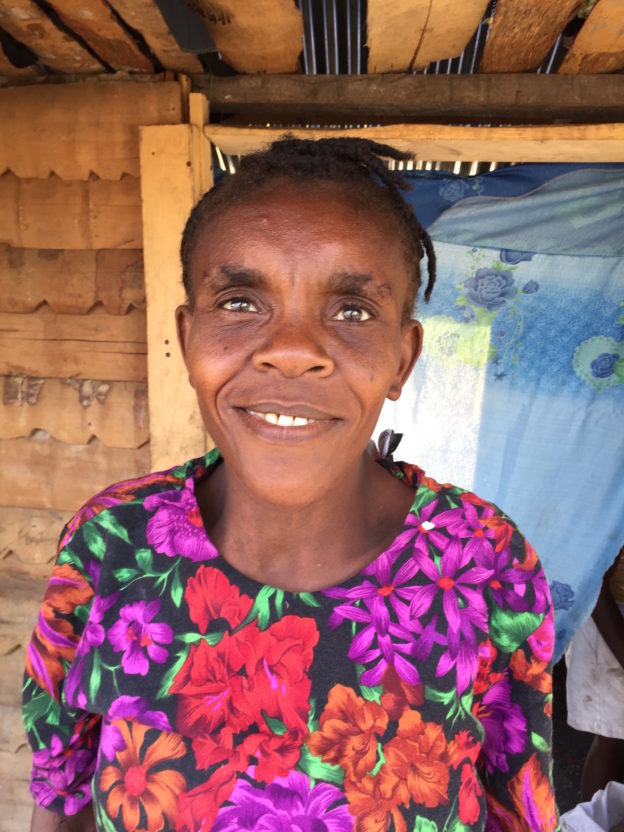Clermène Bruno, or Ti Klemèn, lives in an isolated home along a minor road that cuts through Briza. The road breaks off of the main road that leads downtown Tomond to Bay Tourib and then it winds through fields of corn and sugar cane on its way to nowhere in particular. Her closest neighbors are within shouting distance, but not by much.
She says that before she joined the CLM program life wasn’t good for her. “Whenever it rained I’d run around like a crazy person, collecting clothes and children. I’d put them all on the bed and then cover them with plastic. After the rain, we’d scoop the water out of the house with our dishes. Now if it rains during the night I don’t even know it until I get up.”
She’s proud of her new home. “CLM helped out, but we’re the ones who did it.” Her husband did all the building himself, without hiring extra help. “That way, we got the money that CLM pays builders.” And she and her husband put the money to good use. They bought extra roofing material and lumber to make a bigger house than CLM members can normally afford. And that’s important because all eight of the couple’s children live there.
Her husband used to support the family by working as a day laborer in their neighbors’ fields. Sometimes he would get a few days’ work milling and then boiling down sugarcane in a local mill. He was part of a team that would make molasses to sell to rum distillers or rapadou, and unrefined brown sugar popular in the rural Central Plateau. But he couldn’t contribute a lot because he has another wife who also has children with him. Ti Klemèn used to manage a small commerce, using loans from Fonkoze to make it work. But between her frequent pregnancies and the continually-increasing number of mouths she had to feed, she never could keep enough money in her business to make it work. So she gave up, repaying her last loan and then dropping out. “If someone had explained things to me, I never would have had so many kids, but now I can’t send them back.”
She’s been in the CLM program for 13 months, and has watched most of her livestock grow. Her boar is almost big enough to sell. She plans to give it just a couple of more months, and then she’ll sell it to buy a cow. A cow is useful as a durable, high-value investment that can open the door to what she really wants. “If you have a cow, and someone offers you a plot of land, you can sell the cow to buy it.”
Her two goats have turned into five. One had two kids, and she bought a fifth goat with savings from her stipend. “The other goat hasn’t produced anything. I’m going to take care of it until I can sell it for a good price and buy another.”
She’s especially excited about something extra that the program was able to provide her. Through a new partnership with an organization called Watts of Love, the CLM team was able to get solar lamps for all 200 families in the Tomond cohort. Ti Klemèn likes the lamp because she says she doesn’t have to sleep in the dark anymore. She also finds it useful as she cares for her goats. She explains that if she hears them make noise out in her yard at night, she can go out and see what the matter is. But most importantly, the lamp gives her a way to help her younger children with their homework. “I’m not done with my own work until the end of the day, but now we just turn on the light and look at their lessons.”
She knows she only has five more months in the program, and she’s set herself some goals. She wants to buy her cow and change her goat, and she also wants to buy a turkey. But she’s not focused just on livestock. She wants to prepare herself to rejoin Fonkoze’s credit programs so she can get back into small commerce. She knows that it will be the best way to make sure her income remains steady.
